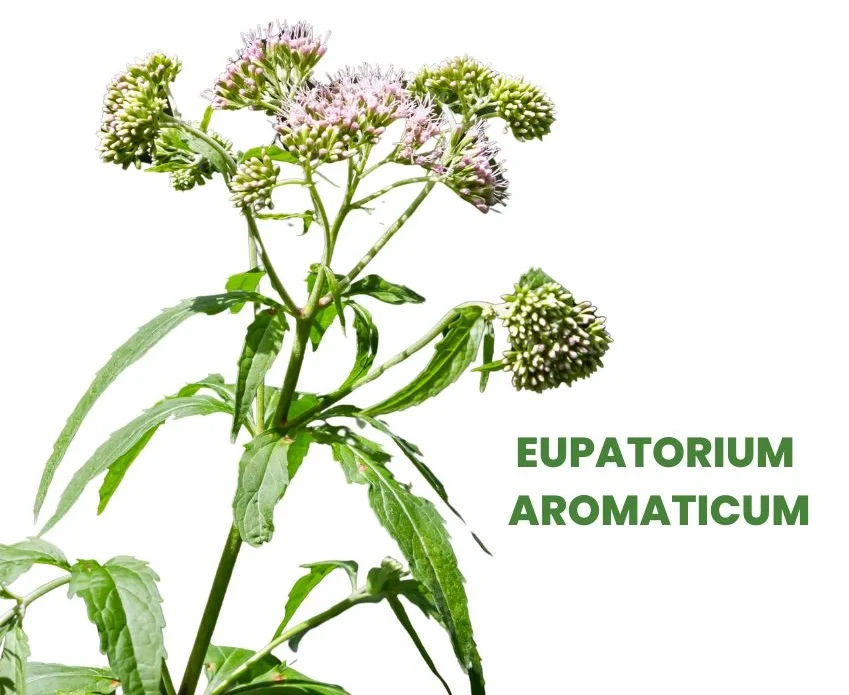Eupatorium Aromaticum, commonly known as Pool-root, is a plant belonging to the Asteraceae family.
Traditionally, this herb has been recognized for its medicinal properties, particularly in treating nervous conditions and gastrointestinal disturbances.

Table of Contents
ToggleSOURCE INFORMATION
Scientific Classification
- Kingdom: Plantae
- Clade: Angiosperms
- Clade: Eudicots
- Order: Asterales
- Family: Asteraceae
- Genus: Eupatorium
- Species: Eupatorium aromaticum
Origin
- Eupatorium Aromaticum is native to the eastern United States and parts of Canada, often found in moist, low-lying areas.
Historical Use
- Indigenous tribes historically used this plant for its therapeutic effects, including treatments for fevers, digestive issues, and other ailments.
- The leaves and roots are typically harvested for medicinal preparations.
DRUG PATHOGENESIS
Eupatorium Aromaticum affects multiple systems in the body, primarily focusing on:
- Nervous System: It addresses symptoms of nervous erethism, characterized by heightened sensitivity and agitation.
- This makes it beneficial in conditions such as hysteria and chorea.
- Digestive System: The remedy helps alleviate gastrointestinal disturbances, including bile vomiting and stomach pain.
- Fever Response: It is particularly useful in low-grade fevers, often accompanied by significant restlessness.
PHYSICAL CONSTITUTION
- Individuals who may benefit from Eupatorium Aromaticum often exhibit a sensitive, nervous constitution.
- They may have heightened emotional responses and an overall disposition to anxiety and restlessness.
DIATHESIS
- Individuals prone to nervous disorders, particularly those experiencing heightened anxiety, irritability, or extreme restlessness.
TEMPERAMENT
- Often sensitive, introverted, and emotionally reactive, these individuals may struggle with stress and may benefit from remedies that promote calmness and stability.
KEY CHARACTERISTICS
- Nervous Erethism: Heightened sensitivity and irritability.
- Restlessness: A constant need to move or change position.
- Low Fevers: Characterized by discomfort and agitation, often with accompanying headaches and stomach pain.
DETAILED ORGAN SYMPTOMS
MIND AND NERVOUS SYSTEM
- Nervous Erethism: Patients may experience agitation and increased sensitivity, often leading to difficulties in concentration and relaxation.
- Restlessness and Morbid Watchfulness: An inability to remain still, often accompanied by an intense focus on one’s surroundings, leading to anxiety.
- Hysteria and Chorea: The remedy may help alleviate involuntary movements and emotional disturbances commonly seen in these conditions.
MOUTH AND DIGESTIVE SYSTEM
- Aphthous Disease: Eupatorium Aromaticum is effective for treating mouth ulcers and soreness, particularly in infants.
- Sore Nipples: Useful for nursing mothers experiencing discomfort.
- Sore Mouth in Infants: Can help alleviate discomfort from oral lesions.
- Vomiting of Bile: Often accompanies gastrointestinal distress and may indicate underlying digestive issues.
- Pain in Stomach: Patients may report cramping and discomfort in the abdominal region.
- Headache and Fever: Often presents as a constellation of symptoms, exacerbated by emotional states.
MODALITIES
- Worse: Symptoms may worsen in the evening or during periods of mental or physical stress.
- Better: Generally, symptoms may improve with rest and local applications of the tincture.
RELATIONSHIP WITH OTHER DRUGS
Comparative Remedies
- Lapsana Communis (Nipple-wort): Effective for sore nipples and piles.
- Hyoscyamus: Addresses nervous disturbances.
- Passiflora: Known for its calming effects.
- Hydrargyrum: Useful in cases of oral or gastrointestinal discomfort.
DOSAGE
- Locally: Tincture applied for sore mouth and sore nipples.
- Internally: Tincture in dilutions up to the third attenuation for systemic issues.
Frequently Asked Questions
What conditions can Eupatorium Aromaticum treat?
- It is particularly useful for nervous conditions, gastrointestinal disturbances, and symptoms related to low fevers, including restlessness and agitation.
Is it safe for infants?
- Yes, Eupatorium Aromaticum can be used for infants suffering from sore mouths and related symptoms under proper guidance.
How is it administered?
- The tincture can be applied locally for specific issues or taken internally in diluted forms.
Glossary of Difficult Words
- Erethism: Increased sensitivity and excitability of the nervous system.
- Hysteria: A psychological disorder characterized by excessive emotional reactions.
- Chorea: A neurological condition causing involuntary movements.
- Aphthous: Referring to small, painful ulcers that occur in the mouth.
- Vomiting of bile: A type of vomiting that includes bile, which is a digestive fluid produced by the liver.
- Attenuation: The process of diluting a substance to reduce its potency.
This overview of Eupatorium Aromaticum highlights its diverse therapeutic properties, particularly in addressing nervous and digestive disturbances.
Understanding its applications and symptoms can help practitioners use it effectively in homeopathic treatments.
